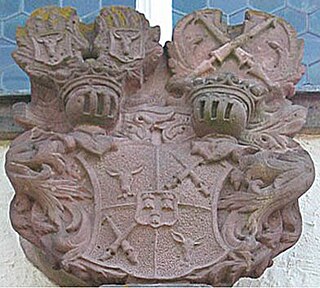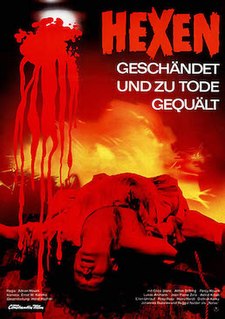See also
| This disambiguation page lists articles associated with the title Tode. If an internal link led you here, you may wish to change the link to point directly to the intended article. |
Tode may refer to:
| This disambiguation page lists articles associated with the title Tode. If an internal link led you here, you may wish to change the link to point directly to the intended article. |

Haapsalu is a seaside resort town located on the west coast of Estonia. It is the administrative centre of Lääne County, and on 1 January 2017 it had a population of 10,236.

Riedesel is a German family name that began to appear in legal documents in the early 13th century. They were of the knightly class, though not all had the official status of Ritter or knight. Its exact geographical and temporal origins are uncertain. However, all of the early references are from the area of Hesse, and many served as vassals of the Margrave of Hesse in Marburg. In later centuries, the men served a wide variety of higher nobility as men-at-arms, administrators, and counselors.

Kanga Sakugawa, also Sakugawa Satunushi and Tode Sakugawa, was a Ryūkyūan martial arts master and major contributor to the development of Te, the precursor to modern Karate.
Tõnu Õnnepalu, also known by the pen names Emil Tode and Anton Nigov, is an Estonian poet, author and translator.

Tode Station is a train station in Fukuyama, Hiroshima Prefecture, Japan.
Hans-Jürgen Tode is an East German sprint canoer who competed in the mid-1970s. At the 1976 Summer Olympics in Montreal, he finished fifth in the C-2 1000 m event while being eliminated in the semifinals of the C-2 500 m event.

Franz Heinrich Kleinschmidt (1812–1864) was a German missionary and linguist who worked in southern Africa, now in the region of Namibia. He founded the missionary station and town of Rehoboth and together with Carl Hugo Hahn set up the first Rhenish mission station to the Herero people in Gross Barmen. Kleinschmidt is known for his scientific work on the Nama language.

Mark of the Devil Part II, or in original German Hexen geschändet und zu Tode gequält, is a German horror film released in 1973. It is a sequel to Mark of the Devil.

Reverend Johann Heinrich Schmelen, born Johann Hinrich Schmelen was a German missionary and linguist who worked in South Africa and South-West Africa. Traveling through the area of today's northern South Africa and central and southern Namibia he founded the mission stations at Bethanie and Steinkopf and discovered the natural harbour at Walvis Bay. Together with his wife Zara he translated parts of the Bible into Khoekhoegowab (Damara/Nama) and published a dictionary.

Finsterforst is a German folk metal band from Schwarzwald, Baden-Württemberg, whose lyrical themes deal with nature, German myths, and fantasy worlds. Formed in 2004, the group has released three full-length studio albums, one extended play and one compilation album.

Tjamuaha was a chief of the Herero people in South-West Africa, today's Namibia, and the father of Maharero. He was a close ally and subordinate of Jonker Afrikaner, Captain of the Oorlam Afrikaners, and stayed with him in Windhoek for most of his chieftaincy. With Tjamuaha's death, hostilities started between the Nama people and the Herero.
Arne Tode is a German motorcycle racer who has competed in the Moto2 World Championship, the Supersport World Championship and the FIM Superstock 1000 Cup. He won the IDM Supersport Championship in 2006 and 2008.

Helong is a Central Malayo-Polynesian language of West Timor. Speakers are interspersed with those of Amarasi. This language has become endangered as a result of its native speakers marrying those who do not speak Helong, and as a result of coming in contact with the outside community. Helong speakers are found in four villages on the South-Western coast of West Timor, as well as on Semau Island, a small island just off the coast of West Timor. The mostly Christian, slightly patriarchal society of Semau do their best to send their children away to Bali to earn money to send home.
Raisa Davydovna Orlova-Kopeleva was a Russian writer and American studies scholar.
Irina Wrona is a German actress.

Das Marienleben is a song cycle by German composer Paul Hindemith. The cycle, written for piano and soprano, sets to music a collection of 15 poems by Rainer Maria Rilke that tells the story of the life of Mary. Thirteen years after its 1923 premiere in Frankfurt, Hindemith began extensively revising and reworking the piece, eventually producing a second version which premiered in Hanover in 1948.

Matthias Nawrat is a German writer.
Peter Ahrweiler was a German actor and theater director.
Decla Film was a German film production and distribution company of the silent era. Formed in 1911 as the German subsidiary of the French company Eclair, it was taken into German ownership in 1915 during the First World War. Since the company was affiliated with Éclair of France, Decla is an abbreviation for Deutsche Eclair. The company was originally founded by Erich Pommer in 1916 as Decla-Film-Gesellschaft Holz & Co. The co-founder of the company is the Berlin film distributor, Fritz Holz, as referenced in the second part of the company's name. Decla kept this name even after Holz left the company. Under the leadership of Erich Pommer, Decla emerged as one of the leading German film companies of the early Weimar era. Assuming control of Meinert-Film, it appointed Rudolf Meinert to oversee production. At the small Weissensee Studios it produced the expressionist film The Cabinet of Dr. Caligari, directed by Robert Wiene.

Truth and Justice is a 2019 Estonian epic drama film directed by Tanel Toom. It was selected as the Estonian entry for the Best International Feature Film at the 92nd Academy Awards, making the December shortlist. The film is an adaptation of the 1926–1933 social epic pentalogy of the same name by Estonian author A. H. Tammsaare.